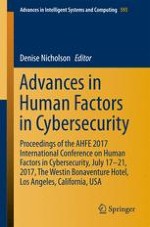2018 | OriginalPaper | Chapter
Adaptive Weak Secrets for Authenticated Key Exchange
Author : Phillip H. Griffin
Published in: Advances in Human Factors in Cybersecurity
Publisher: Springer International Publishing
Activate our intelligent search to find suitable subject content or patents.
Select sections of text to find matching patents with Artificial Intelligence. powered by
Select sections of text to find additional relevant content using AI-assisted search. powered by
